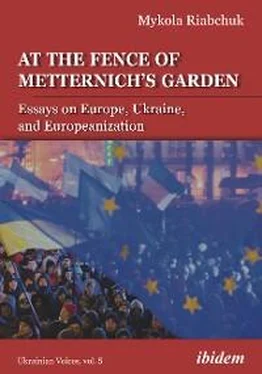A guilty conscience is extremely inventive. Metternich’s approach provided Westerners with a good rationale for their behind-the-fence status; it perfectly reconciled them with Munich and Yalta, with “non-interference” in Soviet “internal affairs”—whether it was the destruction of Ukrainian, Georgian, Armenian independence in the early 1920s, or the invasion of Budapest and Prague in the 1950s and 1960s. This approach was reflected in Lloyd George’s remark on trading even with cannibals, as well as in Roosevelt’s decision to establish diplomatic relations with Russia in 1933, exactly when five to six million Ukrainians were being starved to death by Kremlin cannibals willing to trade.
This approach was expressed quintessentially in the following statement of the British Foreign Office: “The truth of the matter is, of course, that we have a certain amount of information about famine conditions in the south of Russia (sic), similar to that which had appeared in the press … We do not want to make it public, however, because the Soviet government would resent it and our relations with them would be prejudiced” [Carynnyk et al. 1988: 397]
But there is still another side of the problem. Eastern Europe is not as remote a territory as Chechnya, or Georgia, or Armenia, or Kurdistan. Its appearance had been troublesome, its complete disappearance may have been disastrous. The common enemy, threatening from the East, had united Western and Eastern Europeans much more than any common cultural heritage; “Asia”, the powerful ‘other’, to a large extent determined the common identity of the Westerners and the Easterners. Even though the Westerners knew that the ‘true’ Europe began somewhere at the Elbe and Vienna, they saw clearly that “Asia” was coming and that the not-so-true Europe, under these circumstances, should be preserved as a more preferable neighbor. Yes, after Yalta it had been ceded to Stalin, but it still could be maintained somehow as, at least, a not-so-true “Asia.”
Hence, the predominant Western attitude towards the Easterners had always been ambivalent if not ambiguous. On the one hand, many of them believed that the Easterners, to a different degree, deserved their destiny (any people, actually, have the government they deserve!); but on the other hand, many Westerners felt that the Easterners who resisted “Asia’s” advance, did deserve (to a different degree) their sympathy and support. And indeed, the Easterners had enjoyed this support—to the extent described above by the statement of the British Foreign Office: not to irritate the Soviet government and not to deteriorate the relations with them. In other words, not to mar trade with the cannibals completely.
Of course, there have always been some intellectuals in the West who perceived Eastern Europe without an Orientalizing gaze and primordialistic bias. For some of them, Central Europe has become the “idealized Europe of [their] cultural nostalgia.” They demonstrated at Soviet embassies and organized various committees to defend eastern dissidents with unpronounceable names; they signed petitions and published articles; they visited East European capitals and smuggled subversive literature; sometimes they became more native than the natives themselves; they were involved, engaged, and enchanted. Many of them enthusiastically believed that “this part of the Continent was once a near-paradise of cultural, ethnic, and linguistic multiplicity and compatibility, producing untold cultural and intellectual riches” [Judt 1990: 48], and that despite totalitarianism, or even because of it (in response to its pressure), Eastern Europe was a country of “wonderful spiritual tension” [Zagajewski 1987: 36]. This view, however plausible it might be, never spread beyond the narrow circle of specialists on the area and members of the East European diaspora.
In general, the ambiguous Western attitude toward Eastern Europe has been largely determined by geopolitics, i.e., by cold calculations and the age-old principle “charity begins at home.” It may seem reasonable and hardly blameworthy. What was reprehensible, from the Easterners’ point of view, and ultimately detrimental for the very idea of liberal democracy and for the West as its standard-bearer, was the perceived cynicism of Western politics and its penchant for double standards, both at home and elsewhere. The Easterners could not take in the Weberian notion of morality in politics as arguably determined not by motives, however nice, but by the ultimate (and achievable) results. They felt like abandoned lovers, seduced by lofty ideas and passionate words but left in the cold, with a crude “Asia” on the one side, and a restrained Realpolitik on the other.
Not so seldom, this disappointment resulted in zealous anti-Westernism, nationalism, xenophobia, isolationism, and autarky. Indeed, the question whether the Western civilization is superior to any other civilization, is not so simple, as we know nowadays from the bountiful postcolonial writing. Whatever we think on the issue, we cannot dismiss the sheer fact that Eastern Europe is a part of Europe and, moreover, a part of the modern world. And modernity, whether we like it or not, is unavoidable and inescapable, insofar as humankind has entered it. We may regret, and complain, and condemn it, but there is no way back. It is like the biblical Fall, the lost innocence, the bygone childhood. We may dislike our adult life but it is the only life to live. We may find the Western political system sometimes arrogant, sometimes hypocritical, but all other systems are worse, and all the attempts to install them, to alter modernity with some kind of pre-modern or anti-modern utopia proves funny at best, or bloody and exhausting at worst—as we could observe in too many places in the world.
Our attitude to the West should be neither extolling nor disparaging. The West represents rather relative than absolute goodness. For East Europeans, who have been sandwiched between the West and Russia, it merely means that the West is a lesser, much lesser, evil. Such a measured, ambivalent attitude might be perhaps a good response to the Western ambiguity vis-à-vis the East. There are no permanent friends in international relations but there are permanent interests. The East Europeans’ primary interest has been to survive, the Western Europeans’ interest has been the same, albeit far less topical and existential.
The East Europeans are still [1997] much closer to “Asia”; their democracies, economies, and military forces are much weaker; their escape from “Asia’s” sphere of influence still is questionable, and their independence is vulnerable in all possible terms. Hardly surprising then, that they want to remove the fence of Metternich’s garden as far to the east as possible. And hardly surprising that the Westerners do not understand this haste and nervousness. For the Westerners, “Asia’s” comeback looks neither plausible nor very daunting. They have more time to prepare themselves for any surprise, and they have more means to encounter it.
Thus, the East Europeans can really rely on their Western neighbors—but only to the extent to which their interests coincide. Sometimes they coincide significantly, sometimes not. But at no time should the Easterners rely on their Western allies completely. It is not a marriage of love, but merely of convenience. At any time, the Western attitude may suddenly change because of some higher reasons, some whimsical calculations—or misreasons and miscalculations, ultimately it does not matter. What really matters is that any moment the East Europeans may be betrayed again, and sacrificed, as it has happened not once in history.
All their advantages notwithstanding, they have neither the military nor the economic resources of Russia. And they will never be as attractive, promising, disappointing, concerning, disturbing, menacing as their Eurasian neighbor. In these terms, the Western approach towards Eastern Europe will always remain as it has always been, utilitarian and instrumental. Charity begins at home, just keep this in mind.
Читать дальше












